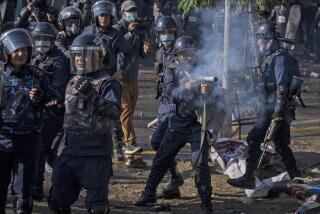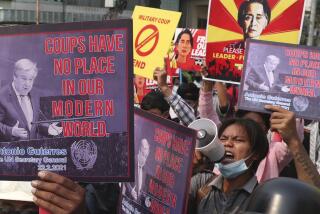King’s Concession Ends Nepal Standoff
- Share via
KATMANDU, Nepal — Threatened with a popular revolt, King Gyanendra on Monday announced the reinstatement of parliament and offered condolences to the families of more than a dozen people killed by police during pro-democracy protests that have paralyzed this country for nearly three weeks.
The monarch said he was acceding to a key demand by the political coalition opposed to his absolute rule. He summoned parliament to convene next Friday in what would be its first meeting in nearly four years.
“We call upon the seven-party alliance to bear the responsibility of taking the nation on the path to national unity and prosperity, while ensuring permanent peace and safeguarding multi-party democracy,” Gyanendra said in a nationally televised address.
The alliance announced this morning that it would accept the king’s offer, and would start the process of scheduling elections for a special assembly that would rewrite Nepal’s Constitution, possibly doing away with the monarchy that has ruled the country for more than two centuries. The alliance also said it would continue to work with Maoist insurgents.
The alliance also announced that it wanted former Prime Minister Girija Prasad Koirala, who leads Nepal’s largest political party, the Nepali Congress, to head the new government, the Associated Press reported.
His offer to restore parliament came after 19 days of sometimes bloody protests that sent hundreds of thousands of Nepalis onto the streets.
The announcement late Monday appeared timed to take the steam out of a massive rally this morning here in the capital, which opposition leaders and activists had vowed would be the largest demonstration ever seen in this Himalayan nation.
Monday night’s speech immediately sparked small street celebrations in scattered parts of Katmandu.
“I’m happy,” said Prakash Mansingh, general secretary of the Nepali Congress Democratic party, adding that today’s planned protest would “turn into a victory rally.”
Festive crowds began filling streets in the early morning hours.
Beyond the coalition, the king’s latest olive branch could run into trouble with two other important constituencies: the public and the Maoist rebels who have waged a decade-long insurgency in the countryside.
Explosive anger toward the king has built up among his subjects in recent weeks, especially after security forces acted on royal orders to shoot on sight during the protests.
Many Nepalis say they will not be satisfied with anything less than a full republic, and have warned the political parties not to compromise.
As for the Maoists, they have formally thrown their support behind the protest movement but could withdraw it if they view the alliance as selling out.
Still, the jubilant gatherings after Monday night’s three-minute address stood in stark contrast to the derision that had greeted the king’s offer last Friday to let the seven-party coalition choose a prime minister. His speech that evening was widely rejected as both inadequate and offensive, because it praised the security forces but failed to acknowledge those who had died at their hands.
“He didn’t once mention remorse for the loss of life,” said Yubaraj Ghimire, the editor of a newsweekly.
After a weekend of protests, Gyanendra came under intense international pressure to meet the opposition’s demands. His decision to relinquish some of the power he has wielded since sacking the government 14 months ago seemed to come at the last minute, after a day of reports of negotiations and possible face-saving measures.
The king’s videotaped address was broadcast at 11:30 p.m.
Pankaj Nepal, a 40-year-old bank worker, was out on the streets minutes later.
“The king has reinstated the parliament, which was the primary demand of the political parties. It’s something” to work with, Nepal said. “I have taken it positively. I’m very much hopeful.”
Special correspondent Bikas Rauniar contributed to this report.
More to Read
Sign up for Essential California
The most important California stories and recommendations in your inbox every morning.
You may occasionally receive promotional content from the Los Angeles Times.














